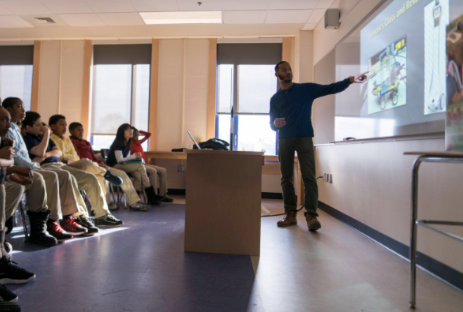Boston-Based Organization Helps Jamal Grant To and Through College
March 22, 2018
By Mai P. Tran, ECMC Foundation

Jamal Grant with his former Bottom Line counselor, Rachel Smith and University of Massachusetts President Marty Meehan
Jamal Grant, a Massachusetts Institute of Technology (MIT) aerospace engineer who also runs a local education nonprofit, credits Bottom Line for his success. Bottom Line helps students who are low-income and the first in their families to attend colllege in the Boston, Chicago, New York City and Worcester, MA metropolitan areas get into and through college.
Though Grant was an ambitious student, he lacked guidance both at home and at school on how to apply for college and financial aid. "I was getting ready to start the daunting process of applying to college, but I knew very little about the application process," Grant says.
Grant didn't ask his parents for help because neither of them had gone to college; and he also couldn't get the intensive help he needed from his counselors who were stretched thin on time and resources.
In his junior year, Grant reached out to Bottom Line, after learning about the group's one-on-one guidance, support with college and FAFSA applications, and help with deciphering and analyzing financial aid packages.
The level of support surprised him. "Bottom Line was much more than some call center or Google search for answers. It was a nurturing environment." His counselors met with him every two to three weeks. Using a database system that tracks the progress of each student, counselors are able to monitor each student's progress and make sure they meet all required benchmarks.
"Counselors are always checking in. They kept tabs on us," says Grant. He jokingly adds, "You have to go out of your way to avoid your Bottom Line counselor."
A hallmark of the Bottom Line model is its focus on financial literacy and helping students evaluate whether they can afford the colleges they want to go to.
"We participate as much as possible in their choice, and make sure they understand the different options in terms of costs and the financial obligations they are taking on," says Alissa Silverman, chief growth strategy and development officer at Bottom Line.
"Discussions about affordability helps students avoid summer melt," Silverman says. Summer melt is the phenomenon in which a student applies to college, is accepted, but fails to matriculate to his or her first semester – often because they realize they cannot afford to pay their tuition bills.
As a result of Bottom Line's approach, students in a recent randomized controlled trial reported that they are 10 percent more likely to rank costs as one of their top deciding factors for college and also report that they feel more confident about their ability to afford college.
Grant says that his Bottom Line counselors played a critical role in picking a college that balanced his career goals with affordability. "We talked about return on investment, the obligation to pay back loans, and how excessive debt might inhibit me from attending graduate school sooner," he says. After carefully weighing his choices, he turned down New York University and enrolled into the engineering program at University of Massachusetts, Lowell.
Once in college, Grant joined Bottom Line's College Success program, where he continued to receive guidance from counselors around his academics and future career. He received support in four areas, as part of Bottom Line's DEAL model: Degree, Employability, Financial Aid, and Life. The four areas focus on connecting students to on-campus resources for academic support; helping them link academic interests to potential career paths; assisting with financial aid renewal; and resolving and answering any questions about finances and payments.
The approach is also personalized and tailored to each student's needs. For Grant, it was help with career advice, where he received support with resume writing, tips on searching for jobs, how to use his LinkedIn profile, and much more.
After graduation, Grant's support from Bottom Line didn't end. When he told Bottom Line about his aspirations to launch a local education nonprofit, he received guidance and mentorship. Bottom Line's executive leadership team "spent hours telling me how to raise money for my organization and how to build organizational culture," Grant says. "Even in my professional life they're still helping me." In 2016, with Bottom Line's support, Grant launched the NET Mentoring Group, whose mission is to close the achievement gap among K-12 students in STEM education.

Jamal Grant talking to students about STEM careers at his nonprofit, the NET Mentoring Group
Grant's story is one of many successful stories at Bottom Line: 78 percent of students in its College Success program earn a bachelor's degree in six years, which is well above the average national rate of 57 percent and 10 percent for students from low-income and first-generation backgrounds. The organization has an ambitious plan to expand and reach more students. "We're hoping to expand to eight or ten more cities in the next five to 10 years," Silverman says. In 2016, ECMC Foundation provided funding to support Bottom Line's initial scaling plans to serve 11,000 students annually by 2020.
Did you enjoy this grantee spotlight? Read more grantee spotlights here.
